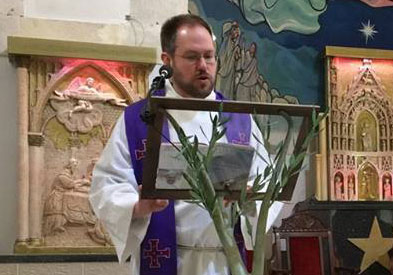August 14, 2016
Editor’s note: Fr. Rich preached this homily for the 20th Sunday of Ordinary Time (Year C) on August 13 and 14, 2016, at St. Austin Church in Austin, Texas. It is based on that day’s scripture readings: Jeremiah 38: 4-6, 8-10; Psalm 40; Hebrews 12: 1-4; and Luke 12: 49-53.
Today, both Jesus and Jeremiah witness to the hardships of proclaiming the gospel. When the good news challenges us to change our ways, it leads to division and discord. Our reading from Hebrews exhorts us to persevere in holiness, ridding ourselves of our own sinful tendencies.
And there’s the rub: when we disagree with other people around us, how can we be sure that we are the people being true to the gospel? For those times when we have caused division for selfish reasons, we ask God for mercy.
In case you haven’t figured it out yet, I have a reputation for being positive and enthusiastic. So, when this gospel passage comes up at daily Mass, I usually preach that Jesus did not walk among us in order to create division. Many of us can live the gospel without creating tension in our families, because our family members share the gospel values, too. For a Christian, division is never a goal in itself. I am skeptical of anyone who tries to prove that they are right by bragging about how many people disagree with them. Please, stick with the merits of your argument.
However, by pairing today’s gospel passage with Jeremiah, the lectionary points us towards the fact that sometimes, following the gospel leads to serious divisions with our neighbors, friends, or family members.
Jeremiah never wanted to be a prophet. Throughout his 40 years of serving the LORD, he repeatedly complained to God for having to be a prophet. And can you blame him? A prophet speaks God’s truth, and in Jeremiah’s time, the truth was tough. Almost every year, the Babylonian Empire launched military campaigns throughout the Middle East. The kingdom of Judah had been ruled by a series of kings who failed to care for God’s chosen people. It was only a matter of time before Jerusalem would be annihilated after generations of corrupt leaders who had turned their backs on God. But the rulers and priests of Judah did not want to hear this. They wanted Jeremiah to tell them that God would protect them from their own negligence. But Jeremiah was compelled to proclaim the awful truth: God would allow the city to be destroyed.
Jesus’ proclamation of the gospel led the rulers and priests of Judea to arrange for his crucifixion. But we know that, for reasons beyond our comprehension, Jesus’ crucifixion was an essential part of the Father’s plan for redeeming the world. The “fire” of which Jesus speaks is not a destructive fire; it is an opportunity for cleansing and renewal.
Millions of our Christian brothers and sisters in other parts of the world face a stark reality today: living out the gospel can lead to martyrdom. Here in the United States, usually the stakes are significantly lower. Friends of mine – over the entire political spectrum – claim that in this election year, there is clearly one presidential candidate or another who is the Christian choice. Well, friends, I hate to break it you: Gary Johnson, Donald Trump, Hillary Clinton, and Jill Stein all favor policies in opposition to Catholic Social Teaching. (Christians are obligated to vote for what they discern to be the “least worst” choice; they should abstain from voting only in extraordinary circumstances. The United States Conference of Catholic Bishops has issued a guide to help everyone in their discernment before the election. I encourage you to check it out!)
It’s not only the election that makes us aware of how divided we are as a nation. The news is filled with stories that, despite the progress we’ve made in many ways, race, gender, and economic status have a significant influence on the opportunities available to people in this country.
There are times when we feel that we must take the risks to proclaim the harsh truths as Jeremiah did. Here is one of Jeremiah’s most famous laments:
Whenever I speak, I must cry out, violence and outrage I proclaim;
The word of the LORD has brought me reproach and derision all day long.
I say I will not mention him, I will no longer speak in his name.
But then it is as if fire is burning in my heart, imprisoned in my bones;
I grow weary holding back, I cannot! (Jeremiah 20:8-9)
But for us flawed human beings, there’s always a danger when we feel we’re being prophetic. It’s a short distance from sparking the purifying fire of the Holy Spirit to fanning the flames of destruction.
One of the downsides of the digital revolution is that we can isolate ourselves from people with other perspectives. We can get our news from cable TV pundits who already agree with us. We can listen to radio channels that introduce us to songs just like the ones we already know. We can surround ourselves with friends on social media who share our opinions. I don’t understand what a friend of mine accomplishes when she retweets an insensitive comment by a political candidate she doesn’t like. Does she expect that sharing this statement will change anyone’s mind? Or will it just make us hate each other more? If a friend wants to convince me to change my mind, he’ll do much better if he doesn’t belittle me in the process.
As St. Ignatius of Loyola often wrote to the early Jesuit missionaries, “Go, set the world on fire!” But let us also remember what the Vietnamese monk Thich Nhat Hanh said: “In true dialogue, both sides are willing to change.”
